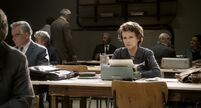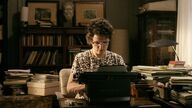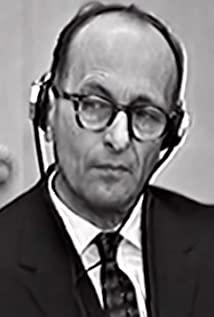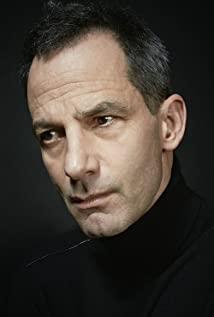The film has almost no entertainment properties. Viewers who know nothing about Hannah Arendt might find it a little strenuous.
Because... there are many characters in it, and some insignificant names are mixed in the conversation, which tests the audience's eyesight and memory again and again.
If you watch the whole movie patiently, you may be shocked by the speech at the end, but when you look back and think about the detailed and lengthy foreshadowing before, do you feel a little "top-heavy" ?
At least I was in this state of mind when I watched it the first time. After watching it for the second time, I had a new discovery - the "foreshadowing" in front of it is the Arendt that this film wants to fully present.
Ordinary biopics record the experiences of characters in different eras in chronological order. This film does not take this ordinary path, but shows Arendt through one event.
So in addition to clarifying the ins and outs of Arendt's reporting of Eichmann's trial, Arendt's past must also be explained: some can be done through her narrative, and some must be reproduced at that time. For example, Arendt and Heidegger have time The emotional lines of the span, interspersed in different parts of the film, directly lead to the jump of the timeline.
Heidegger lived in the mountains and forests in his later years, and Arendt visited him almost every year . The film faithfully shows the two people's leisurely walk in the woods, as well as Heidegger's unpredictable fiery confession. If the audience doesn't know about this, it will inevitably be full of question marks: This Arendt and her husband are so affectionate, they kissed each other when they didn't agree, how could they turn around and have an affair with an old lover in the forest?
Thinking about it carefully, I really can't blame the audience full of question marks. The film's expression of Hannah's emotional world is really vague.
The movie starts with a discussion about marriage. Best friend Mary McCarthy wants to get divorced. Hannah persuades her to calm down. No one is perfect. "You either accept the nature of a man, or live alone." The implication is that turning one eye away is Arendt's "secret to happiness".
Arendt and her husband Heinrich are, in a sense, an inclusive and open marriage. The film repeatedly suggested that Heinrich was stealing outside, but Arendt showed no concern, even if his best friend questioned it. Heinrich also did not interfere with the correspondence between Arendt and Heidegger, and let them fly separately.
It is difficult for ordinary people to imagine that a pair of such intimate partners may have some form of deviance secretly or secretly...
The only difference between you and a happy and romantic marriage is a closed eye.
Best friend Mary McCarthy has a very strong presence in the film. When Hannah's article was criticized, she rushed to the front line to fight back. When Hannah was temporarily living in a country house, she was the only one who went to visit with a bouquet of flowers... From Inner appreciation is the cornerstone of all good relationships.
After Arendt's sudden death in 1975, McCarthy published a piece "Missing Hannah":
Hannah was the least pushy person. She never thought deeply about the impression she made on others . Therefore, whenever she gave a public speech, she would have severe stage fright. After the end, she would only ask, "Is it alright?" Naturally, she will not make fun of it in private or in public, even if it is a little flattery that is often needed in social interactions. , she can't, she's not good at pretending. Although she's always proud of being European and a liar, rather than the brash Americans like us who always blurt out the truth, she's a little arrogant at this point. However, this little pride has never had anything to do with her real achievements. In the long time I've been friends with her, I don't think I've ever heard her tell a lie, not even a white one. If she finds something wrong with what you've written, she won't tell you around the corner, but, without exception, will tell you her thoughts out loud.
I think this passage speaks volumes about Arendt's character, which brings me to the next point I want to discuss - what is the real Arendt like?
After watching the movie, I feel that Barbara Sukova's performance is delicate, the emotions flow between the eyebrows, and the contradictions and unease of a woman under the siege of public opinion are played out, but I always feel that her eyes lack some connotation .
Until I watched Hannah Arendt's interview video, and then went back to watch Arendt in the movie, I have to say, it was completely two people.
I do not deny the acting skills of Cannes actress Barbara Sukova, but her and Arendt's temperament are really different , even if they imitate hard, they still have no intersection.
The real Arendt has a gritty androgynous feel to it, informality. She sat reclining on the sofa, in an open posture, with a strong aura, and the smoking action had already been integrated with her, and it would not attract the attention of others at all. There is a detail in the interview. She suddenly took off her glasses and rubbed her eyes vigorously, almost squeezing out her eyeballs. She was not like an elegant lady at all, but more like a fighter.
Her gaze is firm and unafraid, as if enough energy has been accumulated in her body to continuously provide "electricity". She is by no means sentimental and sensitive, and her body and language are exceptionally crisp and not sloppy. Her voice was low, her tone was steady, and she was smiling, full of wisdom.
On the other hand, Arendt in the movie is too delicate, too sentimental, her posture is introverted, her eyes are flickering, and when she thinks, we only notice the cigarette between her fingers.
She is more like a gentle and kind but psychologically poor mother, rather than a sharp, wise and calm thinker.
The film's theory of "the evil of mediocrity" is condensed in the speech at the end of the film. This line is very wonderful! Arendt jumped out of the position of Jewish victims and truthfully recorded the bad deeds of the "Jewish Committee". The attitude of seeking truth from facts is really admirable. The evil of mediocrity did not only exist between the Germans and Jews during World War II. This kind of thing that does not think and only listens to the instructions of the superiors is everywhere in life, but the evil is big and small. Escaping the "banality of evil" requires every individual in the society to not give up thinking, not evade judgment, be in awe, and take due moral responsibilities. However, under extreme policies, this is easier said than done? Suppose Eichmann has thought about it and realized that killing Jews is an act against humanity, but he has weighed it, and he and his family may be in big trouble if he does not kill, and finally, he has made a more self-interested decision... Mediocre Evil, evil is not an individual, but a totalitarian tyranny. The only thing an individual can do is to remain vigilant against abuse of power and stick to his own moral bottom line.
Finally, the full text of the speech is attached:
"The New Yorker sent me to report on the Eichmann trial, and I decided that the court had only one purpose, to exercise justice. It was not an easy task, because the crimes that Eichmann committed are not found in the code, and such criminals are The Nuremberg Trials had never been seen before. Even so, the judge wanted to define Eichmann as someone who was tried for his actions, not "institution", not "history", not "ism", not anti-Semitism Doctrine, only one person. Nazi war criminals like Eichmann have a problem, they insist that these are not their own subjective actions, as if no one should be punished and nothing to be forgiven. He repeatedly stressed that with the prosecutors Fang's allegation is exactly the opposite, he never did anything of his own accord. He also had no "intent" at all, for better or worse, all he did was "follow orders". This is a typical Nazi excuse...he Let us understand that the most extreme evil in the world is committed by unknown people, who do it with no motive, no belief, no evil intentions or evil aspirations, they just refuse to be human, and I call this manifestation. "The evil of banality." Asked: "Ms Arendt, you avoided the most important part of this debate. You said that if the Jewish leaders hadn't cooperated with the Nazis, so many people would not have died." Answer: "This The issue came up at the trial, and I reported it truthfully. I had to sort out the relationship between the Jewish leaders and the Nazis, because they were directly involved in Eichmann's actions." Ask: "You blame the Jews themselves for causing the Holocaust against them. ?" Answer: "I never blame the Jews! Rebellion is not possible, but maybe there are other forms of rebellion and cooperation, and maybe some Jewish leaders can do something else. It's extremely important to ask this question because Jewish leaders The role played reinforces our conviction that the Nazis caused a total moral decline in European society. Not only in Germany, but almost all over Europe, not only the perpetrators, but also the victims." Q: "The persecution was specifically anti-Semitic, Why do you describe what Eichmann did as a crime against humanity?"Answer: "Because Jews are human beings, and the Nazis just wanted to deny this characteristic. Crimes committed against Jews are crimes against humanity. As we all know, I am a Jew. People accuse me of being "anti-Semitic", for Nazi defense, contempt for fellow man. It's not a so-called argument, it's slander! I'm not defending Eichmann, I'm just trying to connect this extremely banal man to the horrors he did. Trying to understand doesn't mean To forgive. It is my duty to know the truth, and those who dare to speak about it must bear it. Since Socrates and Plato, we have regarded "thinking" as a silent dialogue between ourselves and ourselves, and Eichmann refused to be At the same time as a human being, he also gave up the characteristic of being a human being, that is, the ability to "think". Therefore, he can no longer make moral judgments. This "non-thinking" has led to many ordinary people committing heinous acts. Yes, I Thinking about it from a philosophical point of view. The performance of thinking is not profound knowledge, but the ability to distinguish between right and wrong. I hope thinking can give people the strength to avoid tragedy in a critical moment.”
View more about Hannah Arendt reviews











